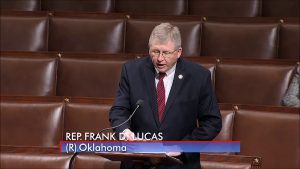
The House has approved two resolutions to repeal the lesser prairie chicken’s status as a threatened species and return autonomy to local farmers, ranchers and wildlife agencies in Oklahoma.
Oklahoma’s House members voted for the measure as it was passed on a 220-209 vote.
“Listing the Lesser Prairie Chicken as a threatened species creates unnecessary burdens on our ability to not only provide for ourselves, but the entire world,” said Rep. Frank Lucas.
“S.J. Res. 9 ensures these onerous and needless regulations do not infringe on our daily lives.”

Congressman Lucas pointed out the population of Lesser Prairie Chickens has increased from approximately 20,000 birds in 2013 to nearly 35,000 in 2020 and was among those who spoke in support of the issue on the House floor.
Rep. Josh Brecheen looked at the constitutional aspects of the issue, pointing out that Article 1, Section 8 of the Constitution and the Tenth Amendment make clear that it is the role of states and individuals, not the federal government to engage in the conservation of wildlife.
” This is yet another example of Biden bureaucrats overregulating American citizens, including Oklahoma’s farmers and ranchers, and usurping Congress’ authority,” he said following the vote.
The effort to repeal the protective status came after the U.S. Fish and Wildlife Service published a final rule on November 25, 2022 to add the lesser prairie-chicken to the federal endangered species list and created two distinct population segments (DPS) with different levels of protections. The species would be listed as threatened in the Northern DPS, which covers areas in Oklahoma.
S.J. Res 9 would repeal the Service’s 2022 listing and return the lesser prairie chicken to being managed by state wildlife agencies within its range. House Republicans contend that by listing the lesser prairie chicken as endangered, the Fish and Wildlife Service will restrict the economic, infrastructure, and land management activities of private individuals and would particularly affect agriculture and grazing activities, including in Oklahoma.
S. J. Res. 24, sponsored by fellow Oklahoman Sen. Markwayne Mullin, utilizes the Congressional Review Act to nullify the U.S. Fish and Wildlife Service’s rule that lists the Northern Long-Eared Bat as endangered. Changing the bat’s listing from threatened to endangered would tighten regulations on private actors, who could be required to receive a permit for actions that may result in the harming or capturing of the bat. Under the bat’s current designation as threatened, local and private actors have greater flexibility in their interactions with the species.






